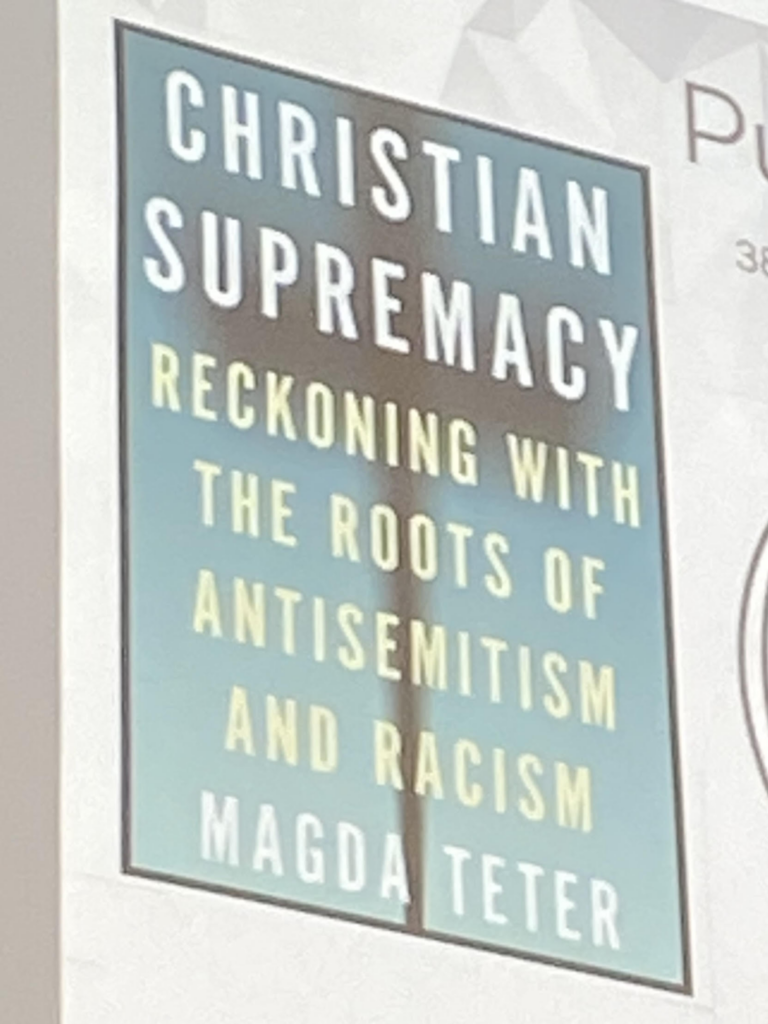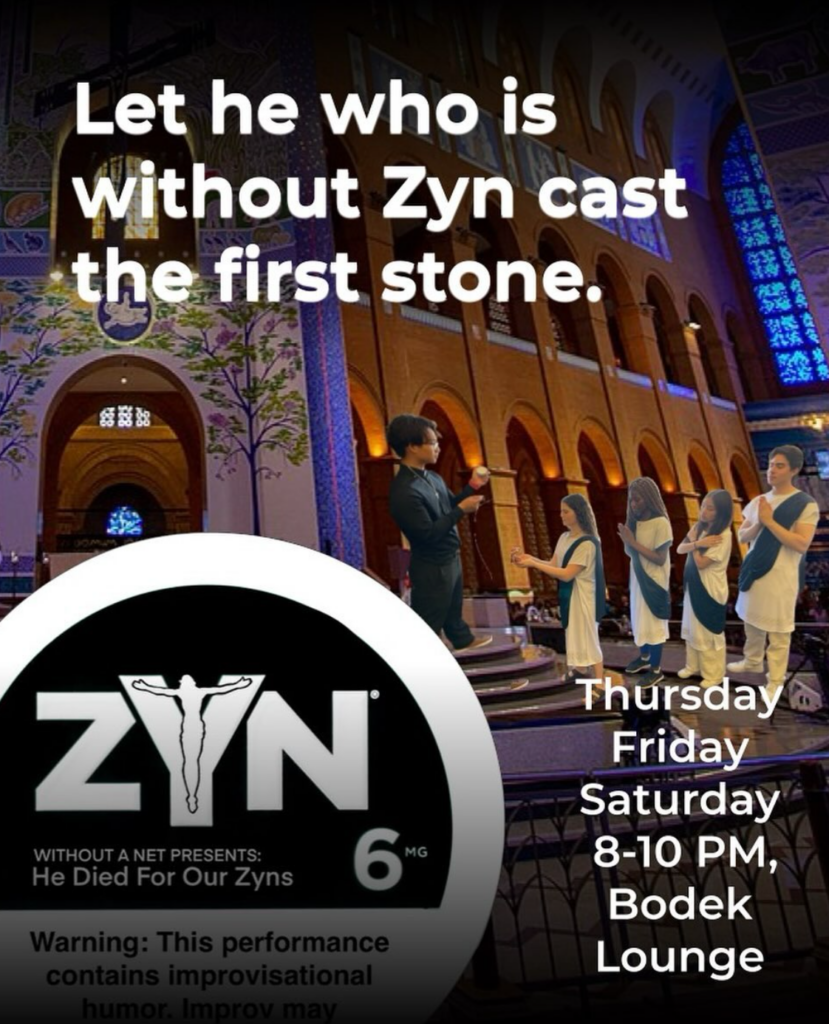In the pursuit of diverse perspectives, has one faith become the casualty?
Saint Agatha-Saint James Parish which is home to the Penn Newman Center during the Mass of the Lord’s Supper (Holy Thursday), March 28, 2024. / Photo credit: Lexi Boccuzzi
By Jennifer Mesa
As I settled into my seat, eager to learn about the history of storytelling, the lecture took an unexpected turn, leaving me grappling with the uncomfortable reality of religious insensitivity in academia. The professor, entrusted with the task of enlightening minds, casually asserted that Jesus Christ was nothing more than a fictional character in the grand tapestry of fairy tales. Stunned, I held firmly onto the cross dangling from my neck and watched my peers nod in agreement with my professor.
Just days later, during a casual morning stroll to class, I was confronted with flyers and emails that added a troubling layer to my realization. They heralded a talk by Fordham professor Magda Teter, coming to speak at Penn to promote her book titled Christian Supremacy: Reckoning with the Roots of Antisemitism and Racism.

For most Christian students, these two incidents will sound like just another day on campus, where anti-religious sentiments have become the status quo. But for everyone else, they highlight how common bias against Christianity is in academic discourse, deepening my sense of unease about the prevailing attitudes towards my faith.
In an era where diversity and inclusion are championed, it is disheartening to witness a growing trend of tolerance selectively applied—more often than not, excluding Christianity. The very institutions that should encourage respectful dialogue seem to turn a blind eye when it comes to anti-Christian rhetoric.
The irony is stark: in an environment that prides itself on inclusivity, Christianity often finds itself isolated and vulnerable to unchecked hostility. The double standards are evident when institutions and students vehemently defend other religions at the slightest hint of disrespect, yet seem hesitant to extend the same courtesy to Christianity. One of many examples can be seen when, in 2022, Harvard University’s Agassiz Theater put on a production titled Iscariot. This musical, which portrays Judas as a gay individual who falls in love with Jesus, mocks the foundational figure of the Christian faith. The production was praised and met with no criticism from the prestigious university.
The same trend can be witnessed at the University of Michigan, when, in 2022, a Christian physician assistant, Valerie Kloosterman, faced discrimination for refusing to affirm statements against her Christian faith, with no option for religious accommodation. Moreover, during meetings, DEI Program Director Thomas Pierce attacked Kloosterman’s religious beliefs, calling her “evil,” and accusing her of causing patients to commit suicide. The discriminatory actions against Kloosterman and the disregard for the disrespectful nature of Harvard’s play reflect the double standards that persist, highlighting an environment that selectively champions inclusivity while promoting hostility towards Christianity.
More recently, this bias is further exemplified by the recent promotional effort by the Penn improv comedy group, Without a Net, for their show “He Died for our Zyns.” The show’s advertising, which irreverently uses the silhouette of Christ in its logo, makes a mockery of Christianity’s most sacred belief—Christ’s sacrifice—on the eve of its religious holiday, Easter. The response to this act of disrespect starkly contrasts with the uproar that would likely ensue if a similar mockery targeted revered elements of another religion, such as Ramadan or Purim. Why is Christianity not treated with the same respect?

To add fuel to the fire, the disparity between reactions is further highlighted on platforms like Sidechat, where students criticizing the show faced unwarranted backlash. Accusations of seeking victimhood were levied against them, alongside a not-so-subtle justification for mocking Christians because of the harm some of them have enacted upon other groups. This perspective presumes that Christians, by virtue of their faith and by the wrongful actions of a select few, are ineligible for empathy or victim status, thus denying them the basic respect and humanity afforded to others. Such responses inadvertently reveal a deep-seated bias, as they hinge on the flawed logic that historical wrongs committed in Christianity’s name somehow justify collective disdain. It’s a stark contradiction to our generational commitment to not make generalizations based on race, religion, sexuality, or nationality. Yet, Christianity is paradoxically excluded from this realm of respect. This selective application of principles, effectively sidelining an entire faith from the compassion and understanding we champion, is itself a form of discrimination.
Academia should be a space for open-minded exploration, where students are encouraged to engage with diverse perspectives, fostering understanding and tolerance. Unfortunately, the vilification of Christianity has become an accepted norm with professors wielding their academic authority to inaccurately depict this faith as nothing more than a relic of fiction or a proponent of evil. While it is crucial to critically examine historical connections and confront uncomfortable truths, it is equally imperative to approach these discussions with sensitivity and respect. Turning an entire faith into a scapegoat for broader societal issues risks perpetuating the cycle of intolerance.
Christianity, like any other religion, deserves to be treated with the reverence afforded to diverse belief systems. Striking a balance is paramount for academic freedom—allowing critical analysis without descending into blatant disrespect. Institutions must take a stand against the normalization of anti-Christian rhetoric, ensuring that all faiths are treated with the dignity they deserve.
As a Christian student navigating these waters, I find myself in the uncomfortable position of silently absorbing lectures that promote intolerance and disdain toward my faith. While my peers are being taught to approach Christianity with distrust and hatred, I am left wrestling with the challenge of preserving my convictions amidst an environment that demands tolerance for every belief except my own.
Despite misconceptions, the largest values of my faith are tolerance, kindness, and empathy. As my professors wish for the dismantling of Christianity, I find solace in prayer, praying that understanding may replace intolerance, and respect may triumph over disdain. It is time for academia to reevaluate its stance on religious discourse, fostering an environment where all beliefs are not only tolerated but embraced with the same vigor we apply to every other facet of diversity. Only then, we can truly claim to be champions of knowledge, compassion, and inclusivity.
Jennifer Mesa is a sophomore in the College studying Political Science and American History from Miami, FL. Jennifer is also the Executive Editor for The Pennsylvania Post. Her email is jenmesa@sas.upenn.edu.


